The crying of a child is always a signal for parents that the baby needs attention or that something hurts him. With children who can already talk, finding out the reason for crying is much easier than with children who cannot yet explain what is wrong. Of particular concern to young mothers is the crying of children immediately after they wake up. About why a child may cry after sleep and how to calm him down, we will tell further.
Why does the baby cry when he wakes up?
Children up to a year
There are many reasons why babies cry:
- hunger;
- wet diapers or diapers;
- lack of attention;
- pain.
A small child may not eat the norm put to him or sleep longer than usual. In such cases, in a dream, a feeling of hunger begins to torment him, and, being already hungry, he wakes up. Usually such crying begins with whimpers, then they intensify, the child begins to turn his head in search of a breast or a bottle, and if he does not find them, then the whimper quickly develops into an angry cry. To soothe crying baby he needs to be fed.
A child may wake up and cry a lot if he peed or pooped in a dream. Wet diapers or diapers in this case unpleasantly pinch the skin, become cold and cause discomfort, from which the child wakes up. With his weeping, he demands the return of comfortable conditions. As soon as the diapers are changed and the baby's skin is clear, he will calm down.
A child who is overly surrounded by attention also cries when he wakes up. This crying is very easy to distinguish from other manifestations of dissatisfaction with the baby. Initially, crying lasts for several seconds with breaks to wait for someone to come or not. If no one comes up, then after two or three attempts to attract attention, the child begins to cry sharply. It is important for parents to track these moments, and if crying is one-time, you can approach the child right away, and if momentary attention has become the norm for him, this must be weaned off, otherwise there will be no peace for the parents themselves.
The child wakes up and cries abruptly when it hurts. Crying is strong, it may be accompanied by grimaces on the child's face and increased muscle tone. The baby can bend its legs and spin a lot. Crying with pain very often begins,  while the baby is still sleeping. In this case, parents need to eliminate the pain itself. Most often, pain in babies is caused by colic, teething, or a beginning disease.
while the baby is still sleeping. In this case, parents need to eliminate the pain itself. Most often, pain in babies is caused by colic, teething, or a beginning disease.
Children after a year
An older child may cry after a daytime or nighttime nap when he wants to go to the toilet. This is especially true for children who are already familiar with the potty. If it was the desire to go to the toilet that caused the crying, the child can go to the potty and continue his dream further.
Another reason for crying can be nightmares. At the same time, the child himself is very excited, and crying can begin even at the time of sleep. To calm the baby, mom needs to hug him.
In a dream or wakes up in the middle of the night with heart-rending cries. Moms and dads at such moments feel helpless. To destroy all fears, let's understand why children cry when they wake up.
The Importance of Sleep
Sleep is an important part of a child's development, especially in the first year of life. And it is at night that the information received during the day is “assimilated” by the brain, new neural connections are formed. Therefore, it is important to understand why and crying. Let's analyze the main reasons.
Sleep conditions
A child developing in the womb is in comfortable conditions, where it is always warm, cozy, and safe. In our world, the baby has to adapt to the conditions environment. The main task of parents is to ensure the comfort of the baby, especially during sleep. The baby may wake up because the room is too hot/dry, the bed linen exudes an irritating scent, or the diaper needs to be changed. Therefore, the issue of comfortable conditions for falling asleep must be approached responsibly:
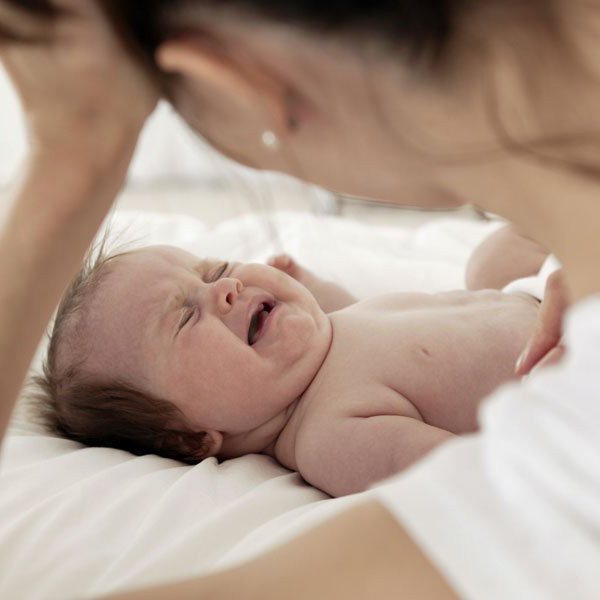
Physiology
The most common reason why a child under one year old wakes up crying is hunger. Breast milk- the main food of the baby, is quickly absorbed, so there can be a lot of breastfeeding. Night is no exception.
The next reason why a child cries in a dream and wakes up is the need for constant contact with the mother. After all, only in the arms of the mother, smelling her, the baby feels safe. Don't skimp on hugs and other displays of love. After all, even an adult child needs a mother's tenderness.
Colic is the main thing that comes to mind when talking about the crying of a child in the first months of life. Until now, doctors have not given a detailed picture of what colic is. It is believed that as a result of muscle tone, which is present in children up to 3-4 months, gases accumulate in the intestines and provoke pain. This is the reason why the baby often wakes up and cries. Relief, as a rule, occurs by 6 months, when the gastrointestinal system of the baby is finally formed.
Another one common cause why baby wakes up crying - teething. This event may be accompanied by nasal discharge and fever. You can ease this period for the baby with the help of children's painkillers in the form of gels for topical use and suspensions for oral administration.
Often the reason why children cry when they wake up is a heavy dinner. Babies have a hard time falling asleep with a full stomach. Sleep becomes superficial, restless. Therefore, in the evening it is better to consume easily digestible foods, such as kefir, yogurt, cottage cheese. 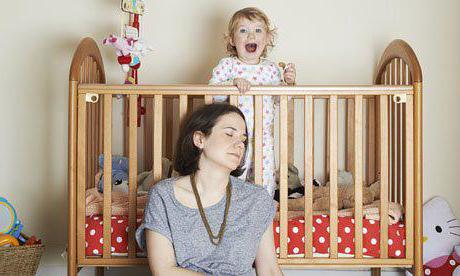
Diseases
The sleep of a sick child is shallow, interrupted. The baby is often prevented from falling asleep either by a sore throat, or a stuffy nose, or a rising temperature. For symptomatic relief and recovery good night adequate treatment is needed, which will be prescribed only by a pediatrician. 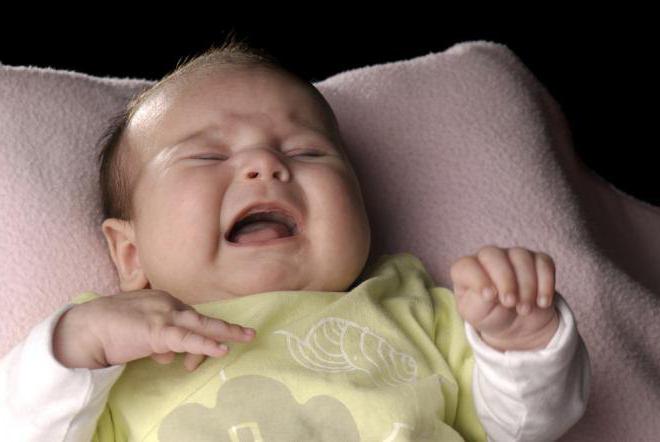
Psychological reasons
Night sleep baby depends on what happened to him during the day. These events can be the reason why the baby cries in his sleep and sprinkles.
Why does the child cry in his sleep and sprinkle? The baby's sleep at night depends on what happened to him during the day. Active time spent with numerous movements, sports, small breaks for rest can be an explanation for why children cry when they wake up.
This is due to the accumulation of the stress hormone cortisone, which keeps the child's body in good shape. It would seem that an actively spent day should provide the child with a healthy sound sleep. But everything turns out the other way around. Therefore, it is important to combine during the day vigorous activity and rest.
Children are very dependent on their parents and not only financially. With mom and dad, they have a subtle psychological connection. If there are scandals in the family, quarrels in which the child is involved, then this injures the baby. As a result, the baby wakes up at night with tears and screams. The main recommendation is that children should not participate in parental disassembly. The reason for night tears for older children may be a quarrel between peers.
New sensations new information, especially in excess, can be the reason why babies cry when they wake up. The brain needs to “digest” a large amount of received impressions overnight. As a result of mental activity, sleep becomes intermittent, the child may cry at night. Watching TV or playing computer games negatively affects sleep. It is required to exclude this type of entertainment from the life of a child, especially in the evening.
Phobias can also cause nighttime awakenings in a child. For example, the most common is the fear of the dark. Working with a psychologist will help here, providing comfortable conditions for falling asleep (sleeping together or having a night light in the room). 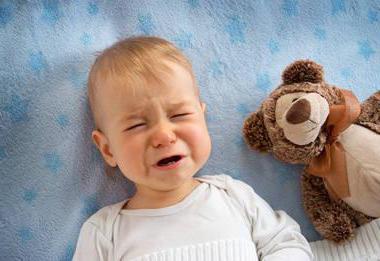
Ways to improve your child's sleep
Each child is individual. There is no general solution to the problem of a poor night's sleep. But there are several universal rules, observing which, you can ensure that the child sleeps at night:
- The daily routine allows you to organize the child and distribute the time of rest and wakefulness during the daytime hours, thereby not overloading the baby. This is especially important for young children.
- Rituals will allow the baby to smoothly go to sleep. After all, everyone was a child and probably remembers how they didn’t want to go to sleep. Establishing bedtime habits such as listening to soothing music, bathing, and relaxing massages will prepare your child for a tear-free bedtime and ensure a long, healthy sleep at night.
- Exclude active entertainment and games in the evening that excite the child's nervous system.
- Early laying. It has been proven that the child healthy sleep you have to go to bed before nine o'clock yesterday. This will allow you to restore strength and recharge your batteries as much as possible.
- A friendly microclimate in the family is a happy child. Happy child good sleep.
- Light has a positive effect on healthy children's sleep.
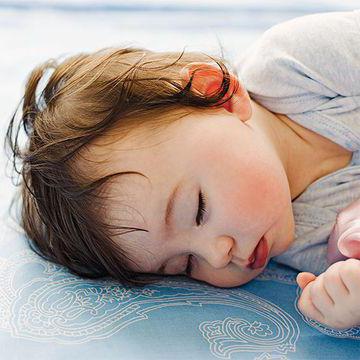
Conclusion
Baby crying is stressful not only for the child, but also for the parent. Therefore, it is very important to understand the reasons why the child cries when he wakes up. Loving parents they will try to determine the reason for the baby’s nightly waking up with tears and help to cope with problems. If anxiety during sleep becomes systematic, its frequency increases, then it is necessary to contact a neurologist for consultation and appropriate treatment.
The crying of a child is always a signal for parents that the baby needs attention or that something hurts him. With children who can already talk, finding out the reason for crying is much easier than with children who cannot yet explain what is wrong. Of particular concern to young mothers is the crying of children immediately after they wake up. About why a child may cry after sleep and how to calm him down, we will tell further.
There are many reasons why babies cry:
- hunger;
- wet diapers or diapers;
- lack of attention;
- pain.
A small child may not eat the norm put to him or sleep longer than usual. In such cases, in a dream, a feeling of hunger begins to torment him, and, being already hungry, he wakes up. Usually such crying begins with whimpers, then they intensify, the child begins to turn his head in search of a breast or a bottle, and if he does not find them, then the whimper quickly develops into an angry cry. To calm a crying baby, you need to feed him.
A child may wake up and cry a lot if he peed or pooped in a dream. Wet diapers or diapers in this case unpleasantly pinch the skin, become cold and cause discomfort, from which the child wakes up. With his weeping, he demands the return of comfortable conditions. As soon as the diapers are changed and the baby's skin is clear, he will calm down.
A child who is overly surrounded by attention also cries when he wakes up. This crying is very easy to distinguish from other manifestations of dissatisfaction with the baby. Initially, crying lasts for several seconds with breaks to wait for someone to come or not. If no one comes up, then after two or three attempts to attract attention, the child begins to cry sharply. It is important for parents to track these moments, and if crying is one-time, you can approach the child right away, and if momentary attention has become the norm for him, this must be weaned off, otherwise there will be no peace for the parents themselves.
The child wakes up and cries abruptly when it hurts. Crying is strong, it may be accompanied by grimaces on the child's face and increased muscle tone. The baby can bend its legs and spin a lot. Crying with pain very often begins when the baby is still sleeping. In this case, parents need to eliminate the pain itself. Most often, pain in babies is caused by colic, teething, or a beginning disease.
Children after a year
An older child may cry after a daytime or nighttime nap when he wants to go to the toilet. This is especially true for children who are already familiar with the potty. If it was the desire to go to the toilet that caused the crying, the child can go to the potty and continue his dream further.
Another reason for crying can be nightmares. At the same time, the child himself is very excited, and crying can begin even at the time of sleep. To calm the baby, mom needs to hug him.
Have you met with such a situation when your baby fell asleep in a good mood, slept calmly and peacefully for several hours, and then, for no apparent reason, woke up crying, screaming and tantrums? At such moments, you experience mixed feelings: bewilderment, rejection and fear. What is happening, what to do, how to help the child in these moments, where to run and with whom to consult? The most terrible thoughts are spinning in your head and every time the baby goes to bed, you are horrified by the moment of his awakening.
Why does a child wake up crying?
If this happens to a very young child, the explanation for this may be hunger, wet diapers, teething, colic and other similar physical inconveniences that the baby may experience upon awakening due to its infancy. The situations with isolated cases when a child wakes up crying are also understandable: this is quite possible if he was frightened of something when he woke up and did not see his mother next to him, this is real and if he had a bad dream, or he lay down the pen. But what to do if sobbing and tantrums upon awakening become an everyday event, and the child is no longer a baby?
In fact, there is nothing wrong with that! Such a seemingly strange phenomenon has quite understandable and logical explanations. The fact is that in a sleeping person, outwardly at rest, a variety of physical actions and mental processes take place inside the body. So, during sleep, our cells divide and grow, and the brain works hard: it processes all the information that it received during the day, puts aside the necessary and discards the unnecessary. In addition, the very process of finding a person in a dream has several phases - this is a nap, REM sleep, deep and shallow sleep. Remember how you felt if you ever had to wake up repeatedly at night and fall asleep only in the morning? Or maybe take a nap during the day? Of course, all people are different and we all go to bed at different times and sleep differently. But in any case, sleep at these moments, especially during the day, is more superficial, not deep, when a person’s consciousness is, as it were, in a constant state of transition from sleep to wakefulness, and upon awakening, a person’s consciousness seems to be confused. Then, waking up, a person feels broken, drowsy, lethargic, his thoughts are confused and foggy. He does not understand where he is, what he is doing and what he feels. In medicine, there is even such a thing as "confusion" or "sleepy intoxication." Such behavior of an adult, along with somnambulism (sleepwalking), nightmares, frequent awakenings during sleep, bruxism (teeth grinding), enuresis, is included in the classification of sleep disorders - parasomnias. However, all this is considered a sleep disorder only in adults!
We are talking about children! If the child wakes up crying - this is NORMAL! The fact is that in children, especially if we are talking about kids 2-4 years old, in which the internal processes of cell growth and information processing are in an enhanced mode, and even a weak psyche that has not taken shape due to its immaturity. A confused mind is considered natural process, which over time, that is, with the growing up of the child, gradually decreases and then disappears completely. Also, pay attention to exactly when the baby wakes up crying. This mainly happens during daytime sleep. And most likely before going to bed, the child was very active and restless. The sleep of a small child is affected by the emotions that he received before going to bed. And if they were not entirely positive or exciting his psyche, the child will wake up alarmed and, probably, crying and hysterical.
What to do if the child wakes up crying?
Follow the child's daily routine so that he always goes to bed and wakes up at the same time.
Provide your child with a pleasant and calm atmosphere, at least an hour and a half before bedtime. No family squabbles, active games or emotionally exciting events.
Remember the ritual of falling asleep - this is when every time before going to bed you perform the same actions familiar to the baby: kissing, reading fairy tales, light massage, taking a bath and the like.
Make sure your child wakes up comfortably. If the child wakes up crying, try to ensure that the baby always falls asleep in a familiar and familiar place. Be there when you wake up.
If the baby starts crying - calm him down, talk in a calm, even and loving voice, show your favorite toys - let him know that everything is fine and everything is the same, he is safe and his mother is next to him.
You can try, following the child, how much he sleeps and when he wakes up approximately, 10 minutes before he wakes up, wake him up on his own, gently stroking his head and saying a couple of affectionate words.
Most importantly, if your little one experiences discomfort when waking up, remember that this is a natural condition that should go away with time. Of course, if with age your baby becomes more and more restless and still wakes up crying, he constantly shudders in his sleep, screams and no persuasion works on him - contact a neurologist. Perhaps the doctor will prescribe you a sedative or prescribe other medications that will help your baby calmly leave the realm of Morpheus and wake up with a smile on his face.
Many parents have experienced a situation where a child wakes up and cries a lot in his crib for no apparent reason. Naturally, this behavior causes concern for many parents, but almost everyone faces it. It is not necessary to scold the child for this crying, and it is also impossible to perceive such a reaction as whims.
Why does the baby cry when he wakes up?
There may be, in fact, several reasons, and in most of them, parents should not worry too much. Possible explanations for why a baby wakes up and cries abruptly after sleep:
- imperfection nervous system- the child unexpectedly switches from a state of sleep to a state of wakefulness, and this may frighten him;
- the baby dreamed that he had lost his mother, and if he also woke up alone, this could aggravate Bad mood(sometimes when the mother comes into the room, the baby has a real resentment on his face, but this passes after 5-10 minutes, when he begins to understand that the mother has not gone anywhere);
- the child may wake up from hunger or the desire to go to the toilet, such a sudden awakening is uncomfortable;
- as in an adult’s dream, a child could have a numb handle or a sore neck after an uncomfortable position;
- when teething, crying and restless sleep can be frequent companions of the baby;
- neurological problems, diseases.
If a child wakes up crying all the time, then parents should definitely contact a neurologist and a cardiologist. It is possible that they will not reveal any deviations, but it does not hurt to play it safe. If the child then cries after a daytime sleep, then opens his eyes with a smile, then this is one of the options for the norm. Up to 2-3 years, this can happen, and parents just need to come to terms with it.
To eliminate some possible reasons For anxiety, try adjusting your baby's daily routine:
- Before going to bed or shortly before it, the baby should eat well.
It is worth understanding that there is nothing wrong with the fact that the child cries when he wakes up, this is one of the inevitable stages in the formation of the child's psyche and nervous system.
Very often, young mothers are faced with the problem of poor sleep for their babies, when the baby can only sleep in her arms, but as soon as she is put in the crib, she immediately wakes up. Further in our article we will try to figure out whether it is necessary to wean the baby from the hands and how to do it without harm to the child.
At healthy baby all reflex abilities must be developed at the proper level. The most important innate reflex is the sucking reflex. It allows the child to develop properly, receiving along with nutrition all the most important things in order to grow up big and healthy.
It is quite natural that many parents dream that their baby is healthy and sick as little as possible. About how to raise the immunity of a child, about folk remedies, and about vitamins that can be drunk to prevent colds, we will talk further.
The question of how to teach a baby to roll over from his stomach to his back worries many parents. This painstaking process requires patience and correct execution certain exercises. From our article you will learn how to do simple gymnastics to strengthen the muscles on the arms and legs of the crumbs.
Sources: http://womanadvice.ru/rebenok-prosypaetsya-s-plachem, http://nasha-mamochka.ru/index.php/zdorovye/297-rebenok-prosypaetsja-s-plachem, http://my- sunshine.ru/rebenok-prosypaetsya-s-plachem
The only way to express your dissatisfaction, inconvenience or pain for baby is to cry. In most cases, this is the baby's reaction to some kind of inconvenience. But for a mother, crying her child is a kind of test. You can’t ask a baby, or rather, you can ask, but he won’t be able to answer whether something bothers him, scares him, or just had a bad dream. Most often, the child cries, especially after a daytime sleep, for completely natural reasons.
To date baby crying after sleep, the phenomenon is widespread, especially after daytime sleep. Many physicians consider this phenomenon to be a variant of the norm, if neurovegetative disorders or other pathologies are not detected.
The main causes of baby crying associated with the intestines
- hunger;
- flatulence, accompanied by pain.
The main reason for baby crying is hunger. If he is full, then he will sleep long and hard. But if the child is on breastfeeding and mommy's milk is not fat enough and nutritious, the baby will wake up and get nervous much more often than provided for by age norms. Such crying is difficult to confuse with its other type. The baby whimpers, then starts screaming to signal an increasing need for food, while shaking his head and smacking his lips, making it clear that you need to give a breast or a bottle. In this case, either the mother needs to reconsider her diet, or, if the baby is artificial, change the mixture or refer to the instructions for preparing it again.
A baby, especially in the first 3 months of life, may cry from pain in the tummy. Intestinal colic the trouble of any little one. The immature intestines of children only adapt to the digestion of food, even such as mother's milk, gases accumulating in the intestines exert mechanical pressure, causing pain. The child may whimper in a dream, wake up crying, and will scream excitedly, trying to change the position of the body. In this case, carminatives help, which, on the recommendation of a pediatrician, should be given during feeding.
Other physiological causes
- fear;
- the need for a mother;
- wet or dirty diapers;
- pain when urinating.
People, even adults, go from being asleep to being awake in different ways: Some easily and quickly, some slowly and with displeasure. Young children who are slowly "returning to reality" may simply be frightened immediately after sleep if you try to wake them up abruptly. Or something frightens them while they are still half asleep. Therefore, the baby, who seemed to wake up with a smile, may suddenly cry after sleep. Harsh sounds or flashes can negatively affect the emotional state of a young child. This condition is not considered a pathology until 3 summer age.
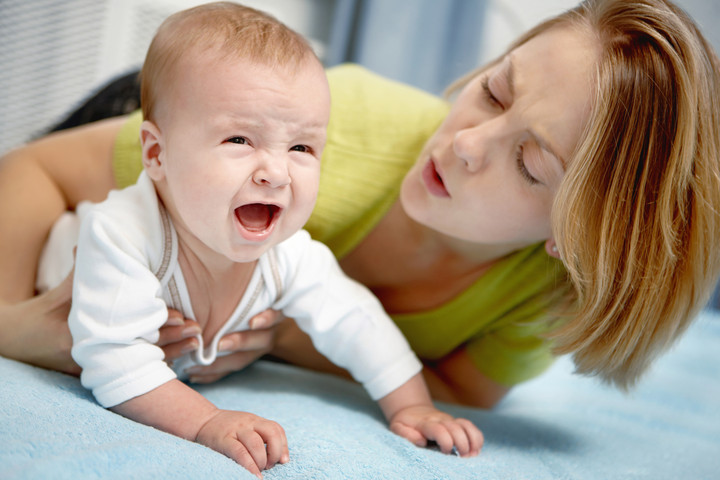
A baby may cry simply because it needs a mother. This is especially true for the first months of life. He was used to feeling his mother's warmth, hearing her heartbeat. And when there are no familiar sounds, he is not comfortable. If you lie next to your baby when you put him down and then leave, he may cry, demanding your presence. There are different approaches to education. Some experts believe that the baby should be kept in "hedgehog gloves" and you should not sleep with him, others that the baby's nervous system is more expensive than principles. And if for some reason your child cannot yet be without you, then there is nothing wrong with being with him. This is for each mother to decide.
Do children dream? Can newborns have nightmares? Even scientists have not yet come to a consensus on this issue. Some believe that it is not, because dreams are a way of processing information, and the newborn brain has nothing to process yet, and imaginative thinking has not yet been developed. Others believe that they are dreaming, since the baby, having got out of the environment of “information hunger” into a new world for him, is surrounded by an abundance of information new to him. It is believed that nightmares begin to visit children after 3 years of age. But, nevertheless, negative emotions in a dream can appear, for example, if a child hears the mother’s angry voice, adult disputes. And this can affect the quality of sleep, in the end, result in crying.
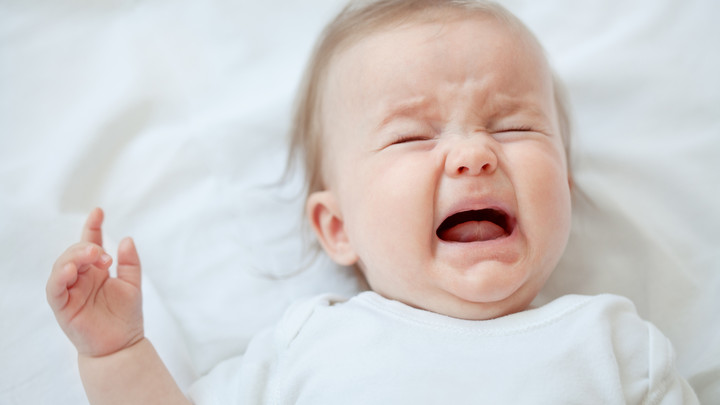
If you use reusable diapers. The baby, having pretty much soaked the diaper, will wake up and demand clean linen. He can only do this by crying. This is quite normal, you just need to change his diapers in a timely manner. A child may cry when urinating if he has already begun to wake up and this moment coincided with the urination act. The kid still does not know how to relax in the process and it is unpleasant for him. This is especially true for boys. Firstly, because they strain the penis during the process, and if you use disposable diaper, and put it on very tightly, or it is already full of urine, the penis may rest against the obstruction and cause displeasure to the baby. Secondly, male infants often have physiological phimosis (narrowing of the foreskin) that makes the act of urination painful. During sleep, boys usually urinate without problems, but if the child begins to wake up, he may cry. It is taught that the baby cries immediately after sleep, of course, this does not happen all the time.
The main pathological causes of crying
- uncomfortable position in a dream;
- the onset of the disease;
- neurovegetative pathologies.
The child may not sleep comfortably, and after sleep something hurts. Crying can also be a sign of an incipient general illness, such as SARS or allergies. If you think that the child's skin is hotter than usual, take the temperature.
The crying of a child after sleep may be a sign of a nervous breakdown or autonomic dysfunction. Children with increased intracranial pressure, limited cerebral dysfunction, hypoxic-ischemic encephalopathy, and a number of other pathologies may suffer from insomnia (sleep disturbance) and wake up crying all the time.
If the baby cries constantly after sleep, it is difficult to distract and switch it, sleeps restlessly, falls asleep badly - this is a reason to see a doctor.
Many parents have experienced a situation where a child wakes up and cries a lot in his crib for no apparent reason. Naturally, this behavior causes concern for many parents, but almost everyone faces it. It is not necessary to scold the child for this crying, and it is also impossible to perceive such a reaction as whims.
Why does the baby cry when he wakes up?
There may be, in fact, several reasons, and in most of them, parents should not worry too much. Possible explanations for why a baby wakes up and cries abruptly after sleep:
- imperfection of the nervous system - the child unexpectedly switches from a state of sleep to a state of wakefulness, and this can frighten him;
- the baby dreamed that he had lost his mother, and if he also woke up alone, this could aggravate the bad mood (sometimes when the mother comes into the room, the baby has a real resentment on his face, but this passes after 5-10 minutes, when he begins to understand that mom didn't go anywhere);
- the child may wake up from hunger or the desire to go to the toilet, such a sudden awakening is uncomfortable;
- as in an adult’s dream, a child could have a numb handle or a sore neck after an uncomfortable position;
- when crying and restless sleep can be frequent companions of the baby;
- neurological problems, diseases.
If a child wakes up crying all the time, then parents should definitely contact a neurologist and a cardiologist. It is possible that they will not reveal any deviations, but it does not hurt to play it safe. If the child then cries after a daytime sleep, then opens his eyes with a smile, then this is one of the options for the norm. Up to 2-3 years, this can happen, and parents just need to come to terms with it.
To eliminate some of the possible causes for concern, try adjusting your baby's daily routine.
